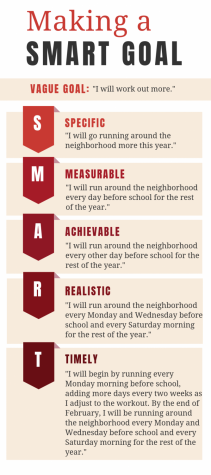New year, same me
The ideology behind creating New Year’s resolutions make them hard to achieve
January 12, 2019
As the holiday season comes to an end, the new year confronts us with the pressure of a supposedly fresh start to the rest of our lives. With this comes the responsibility of setting measurable goals, or rather, resolutions, aimed towards bettering ourselves. But as year after year passes and (perhaps) little is achieved, it’s necessary to reconsider how we’re approaching these traditional objectives.
The concept of resolutions at the beginning of each year is not inherently a bad idea. According to a 2013 study about the efficacy of making goals throughout the year, scientists found that people were more likely to stick with their resolutions after a significant date, such as the start of a new week, an anniversary or a birthday. The new year is a prime example of a “fresh start” that empowers people to visualize their potential for success.
However, the “new year, new me” notion perpetuates the idea of trying to achieve unattainable goals, disregarding our tendency to break them within the first week of January because we expect undeserved rewards. Why should we reap the plethora of benefits from a healthier lifestyle if we aren’t willing to dedicate the time and effort necessary to follow a sustainable plan? At the beginning of every year, we mimic our peers in setting goals such as “work out more,” but going to the gym everyday decreases to going every other day … then twice a week … then once a week … and then diminishes to not going at all.
There is nothing wrong with making attempts to better yourself as a person. However, when we abruptly try to work on generalized goals just because the New Year provides us with a “clean slate,” we’re setting ourselves up for failure.
Junior Trudie Ngo dubs this process of failure “crashing and burning.” Ngo works on bettering herself as a person by creating a list of broad goals for herself and defining smaller objectives for each. She finalizes the goal-making process after a few months of reflecting on what she is capable of achieving and watching YouTubers (such as Rowena Tsai and Lavendaire) who focus on ways to make life meaningful, and she now aims to complete goals week by week. According to her, “crashing and burning” is a part of the process and allows one to gain a better understanding of one’s self and to then create more personalized goals.
Instead of solely making a list of vague resolutions for the New Year, we should create Specific, Measurable, Attainable, Realistic and Timely (SMART) goals whenever we feel motivated to actively change our habits. We shouldn’t view the countdown to Jan. 1 as a reset button on our resolutional timer, but rather a checkpoint to help manage our continuous progress toward success.
For example, as students, it’d be easier for us to set academic goals before the beginning of a new school year, as they would reflect what we’ve learned about ourselves in preparation for what we want to achieve in the coming year. Nevertheless, it’s important to remember that because we are still constantly changing as people, it’s okay to take our time to meet our goals in a way that we consider successful.

At the same time, we should structure our resolutions akin to SMART goals — the paradigm on the left outlines an example of making a goal easier to reach. SMART goals are designed to be specific to each and every individual’s ability, and through making steady progress, one has more of an incentive to achieve it.
Instead of telling ourselves to “work out more,” we’d develop and follow a more specific SMART goal (as seen in the infographic on the left): “I will begin by running every Monday morning before school, adding more days every two weeks as I adjust to the workout. By the end of February, I will be running around the neighborhood every Monday and Wednesday before school and every Saturday morning for the rest of year.” This formula allows us to harness more control over what is doable, leading to better results and sustainable improvement.
New Year’s resolutions are a natural extension of our desire to continuously improve, but in order to make a positive, lasting difference in our lives, they need to be tailored to our personal habits instead of just a subscription to the latest popular trend.
















